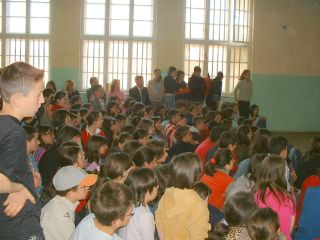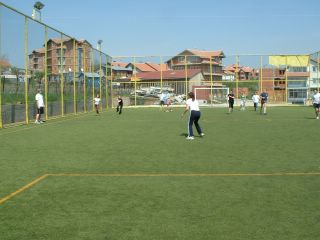"Gori Vatra"
KinoABC, Pristina's only cinema (*and now with two locations*), celebrated its fifth anniversary this week with three days of free French films and, on Friday, a gala, invitation-only preview of the Bosnian film, "Gori Vatra". You see, this is the benefit of working for a theatre organization: getting myself into any supposedly restricted cultural events :) So, despite having political drama o' plenty and other important current events to follow here, the anniversary of a movie theatre somehow received the highest publicity of any single event I've seen in Kosova! It's the same with police and sports, too... The strongest show of police presence I've seen here has been for basket-ball games in Pristina, with the streets literally lined with UNPOL (UN Police) vehicles and officers frisking everyone attempting to cross into the "restricted area" (otherwise known as the city Centre!). It seems to me slightly bizarre, but maybe it's a good sign that cultural events get a lot of support?
Back to KinoABC, the English title of "Gori Vatra" is "Fuse", and the best explanation I've found of it's meaning comes from a New York Times film review: "Watching the story unfold is akin to watching a ridiculously extended fuse burn for so long that you almost forget there's a bomb at the end"... but in a good way :) I'm told that Bosnian cinema is known for its dark humour, and "Fuse" definitely supports that reputation. The film takes place in post-war Bosnia, and tells the story of a small town that learns of a potential upcoming visit by the then-President Bill Clinton. In their frantic struggle to prepare for this honour, the town must deal with the hidden reality of ethnic intolerance, crime, prostitution, and also what they lost during the war. And yet, in typical Jewish humour style, the film manages to deal with the tragic with such comic light-heartedness that the audience is not plunged into total depression.
Maybe some of you have already seen the film? I believe it showed at the Toronto Film Festival sometime in the past two years? But, basically, "Fuse" comes highly recommended to anyone interested in the reality (albeit a theatrical reality) of life in Balkans.


Back to KinoABC, the English title of "Gori Vatra" is "Fuse", and the best explanation I've found of it's meaning comes from a New York Times film review: "Watching the story unfold is akin to watching a ridiculously extended fuse burn for so long that you almost forget there's a bomb at the end"... but in a good way :) I'm told that Bosnian cinema is known for its dark humour, and "Fuse" definitely supports that reputation. The film takes place in post-war Bosnia, and tells the story of a small town that learns of a potential upcoming visit by the then-President Bill Clinton. In their frantic struggle to prepare for this honour, the town must deal with the hidden reality of ethnic intolerance, crime, prostitution, and also what they lost during the war. And yet, in typical Jewish humour style, the film manages to deal with the tragic with such comic light-heartedness that the audience is not plunged into total depression.
Maybe some of you have already seen the film? I believe it showed at the Toronto Film Festival sometime in the past two years? But, basically, "Fuse" comes highly recommended to anyone interested in the reality (albeit a theatrical reality) of life in Balkans.











